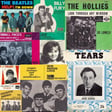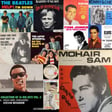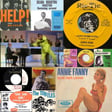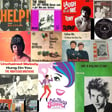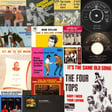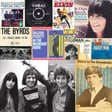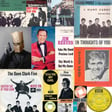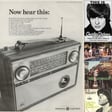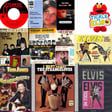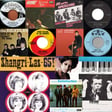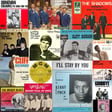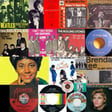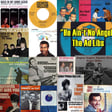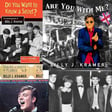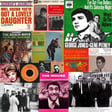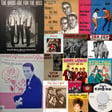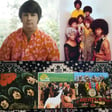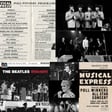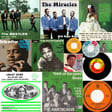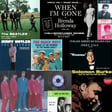Become a Creator today!Start creating today - Share your story with the world!
Start for free
00:00:00
00:00:01

June 1965 (side A)
Following a feature on the albums of 1965, we enter the UK charts for June of 1965. Ticket to Ride, the Who and Tony Bennett are among the bangers in these charts! Support this podcast at the $6/month level on patreon to get extra content! Create your podcast today! #madeonzencastr
Recommended
Transcript
The Beatles' Enduring Optimism
00:00:00
Speaker
The Beatles had this charm, John, Paul and George, and probably then Stuart and Pete, had this charm when things weren't going well, which in their world wasn't very often because mostly it was an upward trajectory, but nonetheless, sometimes you they would have a bad night or the gig didn't work properly or the amps broke or whatever.
00:00:20
Speaker
i say, where are we going, fellas? And they'd go, to the top, Johnny. And I'd say, where's that, fellas? And they'd say, to the toppermost or the poppermost. And right. And we'd all sort Cheer up.
00:00:31
Speaker
I'd say, where are we going, fellas? And they go, to the top, Johnny. And I'd say, where's that, fellas? And they say, to the top-a-most, to the pop-a-most. And I'd say, right. And we'd all sort of cheer up.
Introducing 'Toppermost of the Poppermost'
00:00:57
Speaker
Welcome to Toppermost of the Poppermost for June of 1965. I'm Ed Chin. I'm Kid O'Toole. And I'm Martin Quibbell. Our feature for this month, we're going to take our semi-regular look at the albums which came out in the first half of 1965.
The Beatles and Bob Dylan: 1965 Album Influences
00:01:17
Speaker
five wo We really haven't had a Beatles album since Beatles for sale at the end of 64, though. We'll certainly mention that Help and Rubber Soul were both albums which came out in the latter half of 1965.
00:01:33
Speaker
hey I think we might be speaking about Mr. Dylan in those albums as well. I think so. And we will speak a bit about Motown, although, as we have frequently said, Motown was not an album's label at that point in time.
00:01:48
Speaker
Soon. Yes.
The Rolling Stones' Dual Releases
00:01:50
Speaker
So, all right, we are going into the albums for the first six months of June of 1965. And while we aren't quite to the point where we will be at the end of the year when Rubber Soul and then Pet Sounds come out, we are starting to see albums mean a little bit more than they had in the past.
00:02:11
Speaker
we We picked an album from each of the first six months of 1965, one from each month, and we're going to talk about some of the other albums albums that came out during those six months.
00:02:23
Speaker
So from January, we picked the second UK Stones album, Rolling Stones number two. Yes, indeed. And lot of it is comprised of blues covers.
00:02:38
Speaker
And then there are a few that are original compositions from Jagger Richards, and you can definitely hear them really trying to hone their craft.
00:02:51
Speaker
And you really hear just how much Chicago blues, course I have to say that, but it's true. Chicago blues influence them and how they're really bringing their own brand of blues rock into the mainstream. And this album was hugely successful in England, particularly. I think it was one of the best-selling albums of the year.
00:03:15
Speaker
One of the things we certainly want to talk about is the fact that the US and the UK albums were, in for the most part, very different entities, particularly for records coming to the United States from England.
00:03:28
Speaker
Right, Marv? We'll find it with the Kinks album as well, won't we? Kind of Kinks, where they've changed the way that the albums are sequenced and songs that are taken off and songs that are added to albums as well.
00:03:42
Speaker
So this was the second UK Stones album. The first, simply titled The Rolling Stones, came out on the 17th of April, 1964. And this one has the exciting title, the inventive title, The Rolling Stones, number two.
00:04:00
Speaker
That's straightforward. And it came out in January of 1965. Now, those two records and these singles became three separate albums in the U.S., as we would expect, given what we know about the Beatles and the way the Beatles albums were sliced up.
00:04:19
Speaker
The introductory Stones album was entitled England's Newest Hitmakers. That's not a long title. No, not at all.
00:04:30
Speaker
It's a rubbish title. Yeah. Second came one of the ones that we all remember from the early days, 12 by 5, and that's a nice contrast to England's newest hitmakers.
00:04:42
Speaker
Yes.
00:04:44
Speaker
And so in February would come the Rolling Stones now, which is the U.S. version of the album. The thing about the United States albums is, well, since Alan Klein and ABCO owned the early Stones, Masters, and the songwriting,
00:05:09
Speaker
The U.S. s albums are the ones that are better known and show up in repackagings like the Rolling Stones and Mono we got a couple years back. That's true. The interesting thing to me about the two Stones albums, the Rolling Stones now versus the Rolling Stones number two, is that both of them have 12 songs. you know We keep hearing this, oh, Capitol could only put 10 or 11 songs on a record because of publishing or something else, but that's not the case here.
00:05:39
Speaker
Yeah, that's a good point that this has 12 songs and, you know, and an interesting mix of them too. They can't blame it on cover versions either because there were cover versions on those initial Beatles albums as well.
00:05:53
Speaker
So the Rolling Stones now consisted of 12 songs, seven from the Rolling Stones number two, two singles, one song from the first UK album, the Rolling Stones, and two songs that were not yet released.
The Rolling Stones: Blues and Rock Fusion
00:06:07
Speaker
Ooh. That sounds a bit like they would end up doing with Revolver in in a year. It's more like Yesterday and Today, I think. yeah Although that was kind of a slapdash of both leftovers from Rubber Soul, things that they were stealing from Revolver, singles, and a couple of new songs.
00:06:25
Speaker
That's what I'd meant, was the fact that when Revolver came out, that was altered because they'd already taken a couple of songs from Revolver to add to Yesterday and Today.
00:06:37
Speaker
That's why the US Revolver is so John Right. here because they'd already pinched all of the john allwell Lennon songs for yesterday and today right John Lennon when he heard Rolling Stones number two said well you know I like it the album's great but I don't like five minute numbers Ouch.
00:06:59
Speaker
o Is this one of the Stones' best-known albums? oh No. But I think it really shows how they were really uniquely straddling blues and rock. And as as I mentioned, some of the songs, a few of the songs on this album, they co-wrote. originals and you can tell they're still trying to develop their sound what a shame has a real chicago blues influence to it and so you know you really get a sense on this album of their roots and where they were going but they were still trying to find their footing i think on this album which do you think is the better
00:07:38
Speaker
album between the two the US or the British off the hook surprise surprise Heart of Stone and What a Shame are the Jagger Richards songs that are on Rolling Stones now on the US s version there weren't nearly as many on the UK version.
00:07:54
Speaker
That's true. If you're looking for more originals, then yes you would go for the US version. But I do kind of like this version, the UK version, because it's got so many of these songs that they clearly, quotes, grew up on, whether it's Chuck Berry, Muddy Waters, and even the Drifters.
00:08:14
Speaker
So you really get a sense of all these different genres that contribute to the sound that they would develop. So it's I think if you want a sense of where the Stones were at this point and what they were listening to as they were honing their craft, then the British album.
00:08:32
Speaker
All right. Any thoughts more before we go into the February album? I think the way that it's sequenced is interesting because you could argue the same for a lot of these changed listing albums that you get in in the States.
00:08:48
Speaker
is that you've got these hit singles that are on there that are not album songs, and it almost gives an interesting, rounded look...
00:08:59
Speaker
What you get from these artists like this with the Stones, so you've got this is the hits, and then you've got these songs interspersed in there to give you a rounded image of what the Rolling Stones were like. Like said, you've got the hits, and then these are the hidden gems and these other bits that are there.
00:09:18
Speaker
This is what the Rolling Stones encompass as an entirety. and Exactly. Other albums released in January of 1965, a Scylla, the Scylla Black album, Dean Martin Hits Again, Live, The Ike and Tina Turner Show, The Zombies' first album, The Zombies, Ray Charles' is Live in Concert, and we've been going through a number of singles off of that album of late, and The Chipmunks Sing With Children.
00:09:46
Speaker
Woo! Banger. All right. Kit, why don't you tell us about February?
Curtis Mayfield's Anthem of Change
00:09:51
Speaker
So, yes, February, we chose People Get Ready by the Impressions. Now, I think it's no secret that we're kind of Curtis Mayfield fans on this show.
00:10:02
Speaker
ah we've talked about him quite a bit, but how can you not talk about this when it's got people get ready, this truly iconic song on it, which became civil rights anthem, but it does have some other nice tracks on here. Like woman's got soul. I think we may have talked about that before.
00:10:25
Speaker
i believe we did. Yeah. Yeah. And, Can't work no longer. I found out that I've lost. You know, there's some nice hidden gems on this album. But I think what's really noteworthy here is, again, we're seeing Curtis Mayfield developing his craft, you know, like we talked about with the Rolling Stones album, and but really establishing craft.
00:10:49
Speaker
wayne which was combining soul with gospel harmonies and even some jazzy chord changes. And of course, he showed with People Get Ready what an incredible songwriter he was and could capture a time so well. So I think really it's just another example of how Curtis did.
00:11:10
Speaker
was becoming a dominant force in soul music. And I don't have that much to add because, well, the album did get released in the UK. It took a little while, but the album as released in the UK was exactly the same as the US album.
00:11:25
Speaker
yeah You see, we haven't made any changes there at all. Do we change any albums at all over in the UK? Not that I could see. I mean, we we'll have a couple of others which are, again, exactly the same US albums as released in the UK.
00:11:39
Speaker
The covers sometimes change, and even the titles would change a little bit on some records. None of the ones we chose, but the contents remain the same. yep Anything you want to mention on the Impressions album?
00:11:52
Speaker
I don't know what i could say that Kit hasn't already said, really. I mean, you know, everybody knows I love Curtis Mayfield and I could wax lyrical about him in in an entire podcast, but I've not got the time.
00:12:05
Speaker
The album would reach number 23 on the Billboard charts. o Pretty good. All right.
Bob Dylan's Electric Shift
00:12:12
Speaker
How about March then, Marv? March was a tough one, wasn't it, Ed?
00:12:17
Speaker
Too many choices. Yeah. Remind me again. Okay. Well, we'll do this now then. In March, we had Weekend in London, the Dave Clark Five album. Of course, that's the US title of that album.
00:12:29
Speaker
Mm-hmm. Kind of Kinks, Beach Boys Today. b Brian said of this album. This was of course post-Houston and everything that came after it was a change definitely because after that I started to use a studio differently.
00:12:43
Speaker
I tried to take the things I'd learned from Phil Spector and use more instruments whenever I could. I doubled up on basses and tripled up on keyboards. That made everything sound bigger and deeper.
00:12:54
Speaker
I was able to do more ballads and give them their own feel. The Beach Boys Today, which came out in 65, was made both before and after Houston. It was the first time I could do songs like Please Let Me Wonder that had all the space in them.
00:13:10
Speaker
I was also smoking a little bit of pot then, and that changed the way I heard arrangements. I've Got a Tiger by the Tail by Buck Owens, which has become one of our favourites, and that's a really good album as well.
00:13:21
Speaker
Yes. The Pretty Things... Yeah. Album, The Pretty Things. Bringing It All Back Home by Bob Dylan, which is what we chose. The Miracle's Greatest Hits.
00:13:31
Speaker
The Temptations sings Smokey. Wow. Ike and Tina's Greatest Hits. Wow. Soul Dressing by Booker T and the MGs. And what has to be one of my favorite album titles from that era was
00:13:48
Speaker
by Dusty Springfield. And we'll talk a little bit about that record when, or I will, when we talk about, gee, here's how things changed. I was dying to know how you were going to introduce that. Not disappointed.
00:13:59
Speaker
I think you ought to get a sound sample of that and put it before the credits. And early Beatles also came out in March of 65, but that was just Capitol's re-release of the first album, since they finally wrested it away from VJ.
00:14:14
Speaker
ye This was a tough one because ah think we were down to... Well, quite a few, actually. We picked Bringing It More Back Home by Bob Dylan because we thought of what it did for the culture and for music as a whole with the electrifying of Bob Dylan.
00:14:30
Speaker
It took folk music into folk rock. Because you've got on this album, Mr Tambourine Man, on side two, on the acoustic side, which is ironic because then that would be electrified by the birds and everybody knows that song. That is the sound of the 60s.
00:14:45
Speaker
You've also got Subterranean Omosic Blues on here, which I quite often say is probably one of the first almost rap songs in the s sense. You've got Maggie's Farm on here as well, which is one of Kit's favourites.
00:14:57
Speaker
You've got Gates of Eden on here that's a banger of a song. But then you've got all these other songs on there that are hidden gems on the album as well. You've got like Bob Dylan's 115th Dream,
00:15:10
Speaker
which itself is interesting as well, because there's this thing that John Lennon doesn't like, lengthy songs, but it allows that expanding of songs to be as long as they need to be to get the message across, so to speak. So it changed the world with music that way as well, because it allowed songs to breathe and to be as long as they needed it to be.
00:15:32
Speaker
And then you've you've got, you know, It's All Right, Marlone, Bleeding, which is a classic of his as well. Another long song too. It just pushed so many boundaries in the folk music realm.
00:15:43
Speaker
And also his lyric writing, not only the electric sound on slide one, which is a departure, but even the lyrics on there. I mean, before that, they were a bit more traditional folk. I mean, protest protests.
00:15:57
Speaker
There are some protest songs here, but much more subtle. They can be interpreted different ways. And I'm glad you mentioned Bob Dylan's 115th Dream. That was like Paradise Lost.
00:16:09
Speaker
That is such a dense song lyrically. It's funny in parts and just devastating in others. He's really playing with language here, really expanding language.
00:16:21
Speaker
the kind of lyricism that folk songs could contain. So while the Dylan album made its way over to the UK unmolested, some of these other records coming to the US s from the UK most definitely did not.
00:16:36
Speaker
Marv wanted to talk a little bit about Kinda
The Kinks and US Market Adaptation
00:16:38
Speaker
Kinks. Yeah, Kinda Kinks, they took songs off. They removed Tired of Waiting for You for Crying Out Loud from the American. what What? Why remove that from the song? Because that's one of their best songs.
00:16:51
Speaker
That's crazy. They did that to make room for other songs, but... They removed Tired of Waiting for You from this from the track listing, but it was to make room for Set Me Free, because that is a big hit for them.
00:17:09
Speaker
And they made room for Everybody's Gonna Be Happy, which that is also a good addition to the album. So they made it into an 11-track album from the 12-track album that it was before.
00:17:20
Speaker
So that must mean then that they removed three songs. Naggin' Woman was removed. Yep. Tired of Waiting for You was removed. Yep. Come On Now was removed.
00:17:31
Speaker
Yes. Those are the three that were removed. Yep. They're all great songs. Yeah. What's interesting is so much like Rubber Soul, you had a UK version and a US s version of an album with the same title, but they are significantly different records.
00:17:46
Speaker
Mm-hmm. That's for sure. Fortunately, Rubber Soul didn't get bastardized quite that much. Yeah, really. Now, the Dusty album, as Kit loves, or...
00:18:01
Speaker
Yeah, there you go. That's bad.
Dusty Springfield's Transatlantic Variations
00:18:04
Speaker
yeah That is completely different from the initial UK release, A Girl Called Dusty. That is almost completely a compilation.
00:18:12
Speaker
Even more than Yesterday and Today, it contains some tracks from Girl Called Dusty. It contains recordings that were both on the A and B sides of various singles, and it includes tracks that were from EPs. What?
00:18:30
Speaker
recorded over a period of 18 months so they weren't trying for anything thematically they weren't trying for anything he's just like here's the songs we like here's the songs we think the kids are gonna buy oh it's a good record but there's really nothing that you can really say about that album as an album because well it isn't an album now it follows a pattern that it's not new we'll say that because you'll get this with even at this point legacy artists such as elvis presley you'll have albums that come out that are made up of material that are leftovers from sessions from years and years before so you'll have songs that have no relevance to each other or closeness to when they were recorded and they'll make entire albums up
00:19:19
Speaker
from these leftovers by Elvis and by other artists as well, such as Johnny Mathis and Jim Reeves, as we know, and all these other artists. You'll have all these albums that are just made up from these disparate songs in an attempt for the record companies just to milk as much money out of the public that love these artists as they can.
00:19:41
Speaker
Exactly.
Herb Alpert's Stylistic Transformation
00:19:42
Speaker
All right. So April was the release of Herb Albert's whipped cream and other delights. Well, we've talked about the cover. We don't need to talk about that. Let's talk about the tunes a little bit.
00:19:52
Speaker
Yeah, I mean, this is the album that really saw them nearly abandoning Mexican theme music, and it's really instrumental arrangements of popular songs.
00:20:04
Speaker
Some of them even a little bit of bossa nova, a little bit of Caribbean flair. And heck, never knew that you could perform a striptease. Love Potion No. 9. That's interesting. That's something Herb Albert did. Yes, exactly. and That's true. but I'm just like, wow, that's an interesting reimagining of it.
00:20:23
Speaker
But this really screams 60s, but in a good way. you know Everybody knows the cover of Taste of Honey. You know, i mean, you hear that and it really puts you in that time of the swinging...
00:20:38
Speaker
60s having this on and a you know cocktail party or something with us. It's probably more thinking like Austin Powers kind of stuff. But this was an enormously successful album. It spent eight weeks at number one on the Billboard album charts starting in November 1965. And all, it spent 141 weeks in the top 40 and 61 weeks in the top 10. Wow.
00:21:03
Speaker
wow That's amazing that it was that and successful. And it should be added that the Wrecking Crew provided a lot of the backing on the album.
00:21:14
Speaker
They could play anything. And it launched Herb Alpert really from just being a moderately well-known horn player to something that everybody on knew from the pop charts.
00:21:25
Speaker
Exactly, yeah, really brought his stuff even more mainstream, and it just seemed like it was almost the law, you had to have a copy of this album. It was like an unwritten rule.
00:21:36
Speaker
Much like rumors would be a decade later. Exactly. who yeah and And they both have pictures of people on the front cover, but slightly different. Yes, just a little.
00:21:49
Speaker
Although I'm sure there's some hidden message there behind Fleetwood's choice of clothing, shall we say, on Reels. That's true. We also have in April the Beatles for Sale EP, the US s version of the Zombies LP, creatively entitled Begin Here.
00:22:10
Speaker
The Supremes did a Sam Cooke covers LP, which I only sort of vaguely remember. o I don't remember that. I need to have a listen to that. The Supremes, We Remember Sam Cooke. The song I remember off of there is their cover of Ain't That Good News.
00:22:27
Speaker
Yes. So we talk frequently about how Motown was not really doing theme albums. Well, the Supremes did, even though it wasn't a big hit for them. Come My Way, the Marianne Faithful album, 1,661 seconds with Del Shannon, which we've discussed before, actually, because there were singles from this album.
00:22:46
Speaker
yeah Chuck Berry in London, introducing the Bo Brummels, and the album which we picked for May.
Tony Bennett's Vocal Mastery
00:22:53
Speaker
We were allowed to pick it for May because while it came out on April the 19th in the U.S., it came out sometime in early May in the U.K., and that is If I Ruled the World, Songs for the Jet Set by Tony Bennett, which was the same in the U.S. and U.K. side.
00:23:11
Speaker
This is considered one of Tony's best-reviewed albums. It was arranged by Don Costa, who, of course, we've encountered him many times on this show. And interestingly, one of the songs on here is Tony's cover, Sweet Lorraine, and he dedicated it to Nat King Cole, who, of course, had a big hit with that song, and he died just a month before if I Ruled the World was released.
00:23:37
Speaker
Some of it does suffer from some of the overproduction of the time, but his voice on this is just impeccable. I mean, he does everything from Bossa Nova to Broadway.
00:23:52
Speaker
it just really shows his unique gift that he had for you know, interpreting songs, phrasing, making them his own just absolutely stunning singing. If I were to teach voice lessons, I'd say, listen to this.
00:24:09
Speaker
This is how you do standards. On the songs where the production isn't a bit over the top for some people, you've got productions like that one on the title track itself.
00:24:19
Speaker
That arrangement and the production on... The title track, If I Ruled the World, is superb. And it's like that for a few of the other songs. There's just outstanding work there that can't be beaten, that Costa's done an arrangement for.
00:24:33
Speaker
Absolutely. And Ralph Sharon, he does some incredible work on here. I mean, his piano playing was just unsurpassed. One of those people that makes it sound easy, never overshadows Tony.
00:24:46
Speaker
But if you really listen to what he's doing in the background, like on All My Tomorrows. Just stunning stuff. And then we would get a couple singles. The title track, as Marv mentioned, and Tony's cover of Fly Me to the Moon, which is going to be on the charts not this month, but next month.
00:25:06
Speaker
Yes. Other albums released in May. My Name is Barbara from Barbra Streisand, which we have spoken of. It's the soundtrack to her television special.
00:25:17
Speaker
The second Animals album, Animal Tracks, Great album. Donovan's debut album, What's Been Did and What's Been Hid. Kit's gal, Brenda Lee, with the versatile Brenda Lee.
00:25:29
Speaker
That she is? Yep. That sounds slightly naughty these days, though. I'm sorry. It was a different world back then, ned Exactly. Tom Jones' debut album, ah Along Came Jones. At least they didn't put introducing Mr. Jones or something like that.
00:25:46
Speaker
Ah, me and Mr. Jones. Ah. The Chad Jeremy album Before and After. Astrid Gilberto with the Astrid Gilberto album.
00:25:58
Speaker
Ooh. Nice. And Trini Lopez with the Love album. o Trini. And bringing us... Up to date, we go to June, and June is Beatles
The Beatles' '6': A Lennon Highlight
00:26:12
Speaker
6.
00:26:12
Speaker
six So, yes, it is largely a rehash of what was left off of Beatles for Sale, what Capitol had yet to put out, but there were still other songs on there.
00:26:26
Speaker
The thing which I find most notable is one of John Lennon's greatest vocal performances, Bad Boy 6. hadn't come out yet and in fact probably wouldn't have been recorded if they didn't have to record it for all that darned American album that's coming out.
00:26:46
Speaker
despite the fact that it is 30 minutes and it is a rehash, it is actually a pretty cohesive album. Yeah, I mean, it really nicely balances out the covers that they were still doing at this point with originals. And, you know, you get the sense, and of course we know this from Beatles for Sale, but since we're talking about this one, you definitely hear the foreshadowing of Rubber Soul.
00:27:16
Speaker
some of the more acoustic numbers and some very introspective lyrics. But there's still plenty of pop here. I mean, eight days a week, one of their finest songs at all.
00:27:27
Speaker
But you still get these covers. And thank goodness, as as just said, we have Bad Boy on here because, yeah, that is one of John's best performances. So this is ah transitional kind of album. As I said, very much like Beatles for Sale, of course.
00:27:44
Speaker
And, you know, you're really hearing them go from their early years, you know, they were doing covers and so forth. And now they're doing even more original songs and experimenting with different techniques and recording in harmonies and lyrics, you name it. So just amazing how quickly they're developing.
00:28:06
Speaker
Now, Dizzy Miss Lizzy is the one track on here that does doesn't really fit. It doesn't really fit on Help either, but... No. But it's great. A lot of people would say it's a lesser cover. It's not their greatest cover, I will admit that, but I like it.
00:28:20
Speaker
It just doesn't belong here. It kind of belongs somewhere earlier, almost. Yeah. Yeah. That's true. It almost sounds with the Beatles sort of era.
00:28:32
Speaker
Mm, yeah. With the Beatles, call that their Beatles R&B album. Yeah. So that makes sense. Some of the other albums which came out in June of 1965, The Angry Young Them by Them, Loretta Lynn's Blue Kentucky Girl. Oh.
00:28:52
Speaker
The Byrd's debut album, entitled Mr. Tambourine Man. Of course. The Dave Clark Five's soundtrack album, Having a Wild Weekend. The Yardbirds For Your Love.
00:29:03
Speaker
Sam the Sham's Wooly Bully. The Herman's Hermits live album, Herman's Hermits On Tour. And Frank Sinatra's Sinatra 65, The Singer Today, which, as we have mentioned, might well have been named after Beatle 65 and Beach Boys Today.
00:29:20
Speaker
Yes. So that is the albums of 65. Now we're going to go into the UK charts for June of 1965. All right.
00:29:32
Speaker
Before we get to our show for this month, covering the charts for June of 1965, we want to remind everybody that this show is supported by our Patreon listeners.
00:29:45
Speaker
Yep, and we would like to therefore thank our new Patreon subscriber, George Condos from or condos from Australia, the land down under, who is joining David Modlin and Kevin Lark as fellow patrons. Thank you, guys.
00:30:03
Speaker
Thank you so much. So you can look for our complete interview with Billy J. Kramer, as excerpted in our May feature, But Patreons can get access to the whole thing at the $6 per month level.
00:30:17
Speaker
And extended episodes are also coming and prizes in the near future. Ooh, what the points, mate? Prizes. Yep.
00:30:29
Speaker
another reason why this needs mentioning is because of a recent court case where Apple lost the ability to charge people on their iOS devices, which they were doing with Patreon. They were taking a charge for themselves and now they cannot.
00:30:44
Speaker
So Patreon send you to an alternative page where you can pay without it going through the Apple ecosystem. So no extra money for Apple and you pay less than you would have done otherwise. Excellent.
00:30:59
Speaker
On to the charts.
June 1965: UK Music Charts Overview
00:31:02
Speaker
We're starting with the week of the 27th of May to the 2nd of June. At number one is Long Live Love by Sandy Shaw, which would be at number one for two additional weeks before moving to number three and then number seven.
00:31:18
Speaker
At number two, Where Are You Now, My Love by Jackie Trent, which would stay at number two, then move to number nine, 18, and 24. At number three, True Love Ways by Peter and Gordon, which would move from three to four to 13 15 18.
00:31:36
Speaker
At number five, King of the Road by Roger Miller, which would move from five to nine to 16 to 25 to 30. And at number six, This Little Bird by Marianne Faithful, which would stay at number six for another week, then move to number eight, number 12 and number 15.
00:31:53
Speaker
Top songs are on the way down, it looks like. Indeed, including this next one, which is Ticket to Ride at number 7, which will then go down to 10 and 14, 24 and 32. But course, don't worry, many more bangers on the way.
00:32:11
Speaker
Number 8, Poor Man's Son by the Rockin' Berries, which would stay number 8, then at number 5 for two weeks and go down to number 6 and number 8. Number nine, Subterranean Homesick Blues by Bob Dylan, which would then go to 12, 20, 26, and Boy, didn't last long in the top 10. Interesting. Number 10, The Clapping Song by Shirley Ellis, which would then go up to number verse seven for three weeks, and then number six.
00:32:42
Speaker
And finally, Trains and Boats and Planes by Burt Bacharach, Number 12 now will then go up to 8, then to 6, 5, and 4. Yep. And then at number 13, we've got Manfred Mann's cover version Oh No, Not My Baby, which would then go to 27, 39, 41, and then out of the charts.
00:33:04
Speaker
At number 14, we've got Not Until The Next Time by Jim Reeves, which will go up to 13, then down 18, then 22, then 43.
00:33:14
Speaker
At 15, Pop Go The Workers by Baron Knights, which would then go down to 25, 29, then 50, and then out of the charts. And then Bring It On Home To Me by The Animals, which would go down to 20, to 30, to 45, and then out of the charts. Ed?
00:33:33
Speaker
So lots of songs that are moving down and moving out of the charts this month. who To make room for some good songs and some not so good songs. At number 19, The Price of Love by the Everly Brothers, which is moving up. 19 to number 11 to number 4 to number 2 to number 3.
00:33:53
Speaker
ah number 20, Trains and Boats and Planes by Billy J. Kramer and the Dakotas, which would move from 20 to 19 to 12 to 14 to 23.
00:34:04
Speaker
We didn't mention it last month. We've got a Cashbox review. Mar, if you want to read that. The Cashbox Review says, the boys from Britain have a butte in trains and boats and planes, already starting to move in England.
00:34:20
Speaker
Number is a haunting... I'm sorry, but when they do things like that, get a painful head with that use there of grammar. and ah Number is a haunting sound of Love Lost, which is presented by the boys and instrumental backing... with striking originality.
00:34:41
Speaker
Yeah, originality for a song that's already on the charts by somebody else. That's the Way I Feel is a shade less effective, but first-rate nonetheless. At number 22, You've Never Been In Love Like This Before by Unit 4 Plus 2, which moves from 22 to 18 to 15 to to 14. At number 23, Little Things by Dave Barry, which would move way down from 23 to 43 to 46 to out of the charts.
00:35:13
Speaker
Way on down. Yeah, that was fast. Yeah. Moving up at number 24, Crying in the Chapel by Elvis Presley, which would move from 24 to 14 to number two to number one and then back to number two.
00:35:30
Speaker
We covered that on the U.S. charts in April. At number 26, we've got Ico Ico by the Dixie Cups, which goes from 26 to 24 to to then to we've got I've Been Before by which goes from to then go to and then out of the charts.
00:35:53
Speaker
at twenty eight we've got i'll never find another u by the seekers which will then go to forty one forty five and then now to the charts At 29, we've got We Shall Overcome by Joan Baez, which will then stay at 29 for another week, then drop down to 37, 39 and then go back up to 36.
00:36:14
Speaker
At number 30, we've got Catch the Wind by Donovan, which will then go down 37, 41, 48 then out. And the first song we're going talk about this month, at number 33, the new one from the Dave Clark 5, Come Home, which would move from 33 to 21 to 22 to 19 to 16.
Dave Clark 5: A Critique of 'Come Home'
00:36:37
Speaker
This was a song that was written by Dave Clark and Mike Smith.
00:36:41
Speaker
It's better than the covers we've had of late from the DC 5. Definitely more of those nice hard-hitting drums here. It's a good ballad, but it's a little bit wishy-washy to me.
00:36:54
Speaker
It's fine. It knows what it's trying to do, but there's really nothing exceptional about this record. Low, low hit. Yeah, I completely agree. I thought this was just an okay ballad.
00:37:05
Speaker
Didn't really go anywhere. Didn't really have an interesting story or progression. As I write my letter to death Tears start falling from my eyes I remember things we used to say And the ties that bind our love Only one thing want to do Come home, come home Long as know
00:37:46
Speaker
I'm trying to decide if I like the organ under bed that's you throughout the entire second verse.
00:38:11
Speaker
Nothing remarkable in terms of the lyrics. I do like the prominence of the bass. As I write my letter to death, tears start falling upon my eyes.
00:38:26
Speaker
But other than that, I'd rate it low hit to high meh, maybe. Okay. So it's kind of dull. Ooh, me and Kit are close to each other. Woo! Laid back for the Dave Clark Five, but personally i found it bordering on high meh.
00:38:43
Speaker
We all are basically in the same place. You may like it just ever so slightly less, but not too much. Right. Yeah. At number 34, a song we like a lot. Stopping the Name of Love by the Supremes, which is on its way down. 34 to 44 to 49 to out of the charts.
00:39:02
Speaker
At number 35, the new one from The Who. Any Way, Any How, Any Where, which would move from 35 26 to 24 11
The Who's Innovative Sound
00:39:11
Speaker
to the guitar here. Despite what they to Zach...
00:39:14
Speaker
third teen i love the guitar here despite what they did to za We still love you, Pete. We do. The almost falsetto vocal is great.
00:39:25
Speaker
The drums from Keith are also brilliant. The one element of the Who that you don't get quite enough of in this record is the bass. John Entwistle is maybe ever so slightly underused.
00:39:39
Speaker
It could have used the big bass line, but still, I'm going to rate this a big hit. Once again, we agree. I just think listening to this now, it was ahead of its time. There are going to couple of tracks like this this month where this is sort of signaling the future. With the feedback, Keith Moon's drums are just insane. Roger Daltrey's one of the great rock voices.
00:40:05
Speaker
Among his best performances here, the raspy shouting vocals.
00:40:13
Speaker
Oh
00:40:51
Speaker
This really foreshadows psychedelic and prog rock, particularly at the end when the music speeds up and it's almost this cacophonous kind of finish, but it works. This is a big-time hit, pointing to the future of the mid to late 60s.
00:41:08
Speaker
Definitely. That ending, what we've not said yet is, Nicky Hopkins on piano on this. That comes to the fore towards the end where you've got the piano in there. And what he does on the piano all the way through the song is superb.
00:41:21
Speaker
Because it's Nicky Hopkins for crying loud. But towards the cacophonous ending, it's just amazing what they're all doing.
00:42:32
Speaker
We say cacophonous, but it's not... It's ordered. Yeah, it's not chaotic. No one drums like Keith Moon. Pete's guitar is fantastic. And this song, I think, proves what I was saying to Shell Talmy before he passed away when me and I had that chat with him, where I was saying that Pete's guitar, when he's playing in the song and Roger's doing the singing over the top...
00:42:54
Speaker
Pete's guitar is almost like a clash between the rhythm and the lead guitar because you've got bits of both thrown in there. You'll get the stabs and then the little bits of lick that he'll throw in there. And he doesn't play one or the other. He plays them both merged, mixed up, and it gives it the bite that is essential.
00:43:16
Speaker
Who? To me. An interesting side to this as well is it's a rarity in early Who material because the story goes that Pete had got the song to a sort of level, but then he went to Roger and asked Roger to help him out with some bits that he didn't think that he got quite right. So it's a rarity in early Who catalogue where you've got a co-write song.
00:43:40
Speaker
because Roger helped to finish the lyrics off and to clean them up a bit and put some bits in where Pete didn't have any lyrics to go there. So they go to do their second single and Roger's not was never comfortable with I can't explain.
00:43:54
Speaker
That's not him. You know, he's a he's a little kind of swaggery guy, real tough. He's a hard boy and he doesn't have this insecurity that Pete has. So it's time to come up with his second song.
00:44:06
Speaker
Pete, the art student, or the former art student, ever the art student, is at home one night smoking a dupe, listening to Charlie Parker. And he's kind of transported by Charlie Parker's sax.
00:44:18
Speaker
And he has this, like, feeling of somebody sort of floating and being able to float through things and and this kind of thing. and he And he writes down the words, anyway, anyhow, anywhere. And instead of doing the demo like Pete always has done,
00:44:33
Speaker
Pete just takes this little scrap of paper into a rehearsal one day and says, I have this idea. Let's work on this. um You know, the Who were, for better worse, you know, ah kind of an R&B cover band. That was maximum R&B, and that was definitely Roger's influence. Roger was really the R&B guy.
00:44:52
Speaker
um So Roger takes this opportunity, kind of grabs this, and says, you know, if we're going to write lyrics for this, I want input because I'm i'm not... you know I want something that reflects my personality.
00:45:06
Speaker
And so they work this out in rehearsal, which is also very unusual for The Who. and And the the lyrics are those Roger lyrics. they are and' They're so great. and they're so you know Nothing gets in my way, not even locked doors.
00:45:21
Speaker
and And it's a very much of Roger song. um Because, again, it's his band. But this is you know this song is recorded in April, by September, things are going to be vastly different. This is definitely sort of Roger's song.
00:45:39
Speaker
Interesting. This was at a time where they were developing their style and experimenting. It does have the calm response lyrics that a lot of Who songs had at this point, but that feedback, the drumming, that ending, this is the Who really finding their sound and experimenting, stretching the bounds of what rock is what pop is as i said this is psychedelic rock yeah very much so yep it's also to a certain extent the beginnings of what we're going to get from led zeppelin yeah that's true heath and pete and kit i'm kiddo tool would have these late night conversations about art and pop art roy lichtenstein jasper johns peter grant i are in this kind of thing and um
00:46:28
Speaker
and And using that aesthetic and then and then you know going back to Pete's art school years and Gustav Metzger and auto destruction and even likely A little influence from a young Fluxus artist by the name of Yoko Ono.
00:46:44
Speaker
Cashbox reviewed this record, and what they said was, Dekka's part of the British sound boon is The Who, a rockin' vocal instrumental ensemble that did the Top 100 trick recently with I Can't Explain.
00:46:59
Speaker
There's every reason to believe that a wild one called Anyway, Anyhow, Anywhere is headed for big chart action. A middle instrumental section is a wow, calmer bluesy seas on Anytime You Want Me. Well, that's one time i actually kind of agree with the reviewer, even though the rockin' vocal instrumental ensemble, that's not what I would call it. But the rest of it, yeah. It's not too bad, yeah. Not too bad.
00:47:27
Speaker
But as you were talking then, and you mentioned Yoko Ono, I was thinking about the Beatles and how in 67, obviously we had Sgt. Pepper and I guess they completely changed their image more less overnight.
00:47:39
Speaker
yeah But two years earlier is where we are with Any Way, Any How, Any Where being released. And I'm wondering if if The Who were actually the first band to really ah try and marry a kind of I guess they call it pop art, but just art in general with the music. And Pete has talked about, you know, there's that clip in The Kids All where he's talking about pop music as being art and that kind of thing. And I'm not sure if any other band at that time was really thinking on those lines.
00:48:08
Speaker
i in this That was an interesting thing because I think besides the Beatles, the it goes to the emphasis of singles, that these bands were all making singles because nobody thought that this was thing something that was gonna last forever. John famously, or famous but John mentioned, he said, you know, we really thought that when we turned 21 or when we got married, this was over.
00:48:31
Speaker
So, you know, we we would just make a song and go out and play and make some money, but nobody thought about the longterm. Nobody, none of these bands, but with the possible exception of the Beatles, thought that I am gonna be 80 years old and about to embark on another American tour.
00:48:48
Speaker
you know it was all very flash in the pan all very let's and in in that was kind of the way the industry also saw it looks in and you'll see you know um you'll see these kind of weird bad deals that a lot the in the who especially made these these bad deals that came back to haunt them because nobody thought it was going to be forever you in three years i'm going to be married and i'm going to john quit he was the last member of the band to quit his job but he quit with the day that I can't explain was released.
00:49:21
Speaker
You know, nobody thought it was forever. Yeah, that's it. And I think it's one of the Who documentaries. It might be an amazing journey. And I think it's Noel Gallagher makes the point that it was just kids running these bands, essentially.
00:49:33
Speaker
No one had a clue how to do it because no one had ever done it this way before. Exactly. Exactly. And these impresarios to the Brian Epstein's and the Kit Lamberts and Chris Stamps, they they were all...
00:49:45
Speaker
This was all brand new territory to them, and they and they were able to shape that in kind of their own image. At number 36, The Times They Are A-Changin' by Bob Dylan, which would move from 36 to 48 to Out of the Charts.
00:49:58
Speaker
At number 37, Set Me Free by The Kinks, which would move from 37 to 22 to to to number this is a great ray davi song and We're getting a bit more nuanced guitar from Ray, somewhat similar to Tired of Waiting in style and production, and it sits nicely between the bombastic kinks and the storytelling version of the band we are about to get.
00:50:28
Speaker
Not the absolute biggest hit, but a nice hit nonetheless. Yeah, I like this a little less. It's a nice mid-tempo track, as you mentioned, written by Ray Davies, featuring a softer Davies vocal. He's exploring the different shades of his voice, which is nice.
00:50:44
Speaker
You mentioned Tired of Waiting for You. Yeah, you could definitely hear the similarities, particularly the riff during the line, If I Can't Have You To Myself. I heard the guitar riff. I thought, uh-oh, I'm going into Tired Waiting for You.
00:50:58
Speaker
Louis spotted that as well. I don't want no one. If I can't have you to myself, I don't need nobody else.
00:51:11
Speaker
So if I can't.
00:51:22
Speaker
I would say I don't like this as well as the previous single, but the Kinks are definitely experimenting with different sounds here and commercial sounds, but still, as I said, with Ray exploring the different shades of his voice, guitar.
00:51:38
Speaker
I would say maybe low-medium hit for me. yeah As lead guitarist Dave Davis says, this has a higher vocal range in places than Ray has sung before.
00:51:48
Speaker
There's nice contrast between the sections. Interesting that for a change it's actually got Mick Avery, the band's drummer, playing drums on this as opposed to normally Shell tell me the producer would get a different drummer in.
00:52:01
Speaker
And Mick would play like a bit of percussion. And he does a fine job of it. One of the backing vocalists, Ray's first wife, Rasa, she sings backing vocals on this like she would do on Waterloo Sunset, Sunny Afternoon and lots of other songs. She's in the background on a lot of their hit singles.
00:52:18
Speaker
Oh, wow. um Dave Davies said in his autobiography, Kink, which if you're a fan of music, never mind just the kinks, is a superb, very honest and open autobiography.
00:52:30
Speaker
i I'll just put that out there. ah He says Set Me Free was released pretty quickly to try to kind of counteract any negative effects caused by everybody's going to be happy's lukewarm reaction because it didn't go down very well.
00:52:46
Speaker
And he said, i was very nervous about it being a single, but the night we performed it on Thank You, Lucky Stars in Birmingham, I sensed that it would be a hit. Maybe our confidence had been shaken a little, but we were shaken and not stirred.
00:53:00
Speaker
I like the James Bond thing there. Yeah. So Cashbox says, the kinks are coming off a big English sound hit. I'm tired of waiting for you. Due for repeat chart engagement for the team is Set Me Free.
00:53:15
Speaker
snappy tune that's taken for an engaging disc ride. A nifty start of a chain of hits for the English lads. I Need You, some of the B-side, is a busy affair.
00:53:29
Speaker
Snappy tune! English lads. you Kit, you want to read the next couple here? Sure. Number 38, we have Concrete and Clay by Unit 4 Plus 2, which will then go to 50 and then out of the charts. 39, This Little Bird by the Nashville Teens goes to 38, 44 and out the charts.
00:53:51
Speaker
forty four and out of the charts 40, if I ruled the world, Tony Bennett, yay, um which stays at 40, then goes down to 47, and then out of the charts.
00:54:02
Speaker
41, come on over to my place by the Drifters. This is the last week that will be on the chart, and then it's out. 42, For Your Love, The Yardbirds, absolute banger, which will stay at 42, then go down to 49 and out of the charts.
00:54:17
Speaker
And finally, at number 43, No Regrets by Shirley Bassey, which will go 39, 47, and At number 44, I'm Alive by The Hollies, which will move from 44 to 23 to 10 to 4 to number 1 at the top of the charts at the end of the month.
The Hollies' Vocal Talent
00:54:38
Speaker
This is a song written by the Game of Love author himself, Clint Ballard. It's a bit poppier from The Hollies. It's got that standard layered vocal sound.
00:54:51
Speaker
Big camberine. A great lead vocal from Alan Clark. It's maybe a little bit more 1964, but that doesn't reduce the value of this tune. I'm going to grade it a hit.
00:55:02
Speaker
Wow. All right. This is one time we're going to disagree. All right. I wasn't as crazy about this. You do not love Game of Love either. Yeah. Exactly. and when I saw that he wrote this, I thought, oh, makes sense.
00:55:15
Speaker
Yeah, I'm just not crazy about this track. I feel like it's kind of all over the place musically. That lower range vocal at the very beginning is really odd. And then the vocals return to normal in the chorus.
00:55:27
Speaker
Now I can breathe, I can see, I can touch, I can feel.
00:55:39
Speaker
You gave me all the love I ever made
00:56:03
Speaker
really busy arrangement. I thought, too busy. The lyrics, just kind of boring. I will give it a high mad because this is the Hollies. Their vocals are good. They're the Hollies.
00:56:14
Speaker
But I feel like they deserve better than this. Marv? Yeah. This is maybe, to my ears, more middling hit, upper middle. but It's well performed and everything, but it just doesn't get to that higher echelon that I think that, well, I know that the Hollies can reach.
00:56:30
Speaker
And also not the only Clint Ballard song that we're going to have this month on the UK charts. More stair steps, but actually fairly um large steps down from where I am to where Marv is to where Kit is. Yep.
00:56:46
Speaker
Yeah, interesting. At number 45, leaving here by the birds, not those birds. This is B-I-R-D-S. And this is the only week this record would be on the charts.
00:56:58
Speaker
The other birds, these birds, included Ronnie Wood in the band. Cool. Bunny Wood. This is a cover of the Eddie Holland song.
00:57:09
Speaker
It's not the greatest song. I like the record, though. It's fairly mod. It's got a great guitar solo. It's a good record. I'll give it at least a low hit.
00:57:21
Speaker
Okay, we're back to agreeing now, because I gave it a low hit rating as well.
00:57:38
Speaker
Two by two.
00:58:03
Speaker
I kind of like that this is loud, sloppy R&B, and I say sloppy in the best way possible. There's something appealing about this garage rock-like version. And I'm not sure. I think we've talked about the original Eddie Howland's.
00:58:17
Speaker
Yep. As far as the arrangement goes, I think I like the... soul pop arrangement of the original better and the Funk Brothers we're talking about. But there's just something appealing about this, you know, again, I'm saying it in the best way, rough version. This is real rhythm and blues.
00:58:34
Speaker
I agree, a low hit for me. To answer your question, we did indeed talk about the Eddie Holland version of Leaving Here, but it was on the Billboard charts the first and second week of February 1964. Guess why we don't remember it?
00:58:51
Speaker
if One cash Did we do cash box that week and it didn't show up on cash box? No, because we did cash box in January because the Beatles were on cash box before they were on the billboard.
00:59:03
Speaker
Or do we just not remember this because we didn't like Eddie Holland's vocal on it? That may well have been as well. Yeah. We can't remember we covered it. i am verifying the fact that we did indeed cover it in early 1964. If you want to go listen to our opinion, maybe we should... Yes....go back and listen to the U.S. charts for the Beatles edition. Right.
00:59:25
Speaker
By the way, this is an early Holland-Dozier-Halland composition....
00:59:35
Speaker
Thank you.
00:59:57
Speaker
that guitar sounds fabulously dirty. When Ed said that about Ronnie Wood, it sort of like made a bell go off in my head, you know every time a bell rings an angel. No. And I thought that probably is a predecessor to why he'd be so good with the faces, maybe, because you've got that guitar that work, that it's almost like you can see how we it should work through this to that.
01:00:21
Speaker
Gritty blues rock vocal, guitar solo is fun. Yeah, it's cool. It's different. I think if the instruments that have carried on playing underneath the solo might have been more interesting, rather than doing the stop-start style that was going on through the rest of the song, it might have been more interesting to have heard them just play a bed underneath the guitar solo, and then when the vocal came back, go back to the stop-start.
01:00:48
Speaker
Hmm. That's a valid point. By the way, this very version of Leaving Here inspired Motorhead to produce their debut single, 12 Years Later, and with a cover of this song. This was their debut single, so Motorhead really liked the dirty sound.
01:01:08
Speaker
I would also recommend going and looking for cover versions by Pearl Jam and The Who. Ooh. Mm-hmm. That's the commercial free program. I want to thank Pearl Jam, of course, Mr. Tony Avina right here.
01:01:22
Speaker
Drew Barrymore, God bless you. Good luck you, my dear. The Westchester Ayers Quartet and everybody who helped us out with stupid pet tricks. Monday on the program, Sarah Jessica Parker will be here, Andy Richter and Darrell Hammond. Thank you very much for watching.
01:01:38
Speaker
Tom Schneider is next. Good night, everybody.
01:02:03
Speaker
The women of this town are being disused. I've seen it all in a dream last night. Cause even this town, cause we don't treat them right.
01:02:14
Speaker
Catching chains, driving blame.
01:03:48
Speaker
The way that we treat them in the entire same law One day, one day and it won't be long
01:04:00
Speaker
Say all two-by-two's are bigger All the evening here Don't get two-by-two Tell me what I say Oh yeah Don't clap your hands Just leave them here.
01:05:18
Speaker
At number 46. One, we're going to say WTF not because of the song, but because of the chart placement of this song.
Tony Bennett's Timeless Classic
01:05:26
Speaker
I Lost My Heart in San Francisco by Tony Bennett, which would stay at number 46 for one more week and then go out of the charts.
01:05:35
Speaker
What?
01:05:38
Speaker
WTF indeed. This is a classic. Yeah. ah This is Tony Bennett's signature song. What can you say about this song? The vocal is perfection. It could not be topped.
01:05:52
Speaker
The arrangement is great. It's classy. And most importantly for us, it is small. Big, big hit. What can you say, as you said, perfect vocal, that Ralph Sharon's piano.
01:06:08
Speaker
Stunning in this. I mean, he almost provides like a kind of a comment. When Tony is singing lyrics about San Francisco, and you hear that da-da-da-da-da-da-da-da-da.
01:06:37
Speaker
High on a hill
01:06:52
Speaker
Ralph Sheeran was one of the great jazz pianos. It's a simpler sounding arrangement, but when you really listen to what's going on in the background, particularly with Ralph Sheeran, I mean, he's doing stuff that's unbelievable. And I just have to mention one quick personal story. I always think of this song when I saw Tony Bennett at an outdoor venue here called Ravinia as a huge lawn and people come and picnic out on the lawn and then there's the pavilion. and And I'll never forget one of the times seeing him there and sitting on the lawn and it was a beautiful night.
01:07:29
Speaker
clear skies and I'll never forget when he sang that wonderful line know the little cable cars climb halfway to the stars and I remember looking up at the sky and the stars were out that night and his vocals just paint these wonderful pictures and he was a master interpreter what can I say just a classic yeah I know that Frank and others have done this song but to me this is the quintessential version of this song yep And Louise agreed with me because she said to me that this is smooth.
01:08:02
Speaker
Yes. Tony's vocal is so good. Ralph Sharon's piano is beautiful. The Count Basie orchestra is superb. And Marty Manning's arrangement is absolutely sublime.
01:08:15
Speaker
A perfect recording of a perfect song. For those of you who are visiting the San Francisco Bay Area like I was couple months ago, go and drop by the Fairmont Hotel.
01:08:30
Speaker
The ballroom where Tony Bennett was to first perform, I Left My Heart in San Francisco, is now the Tony Bennett Suite. Oh, nice. and there is a statue of Tony outside of the Fairmont Hotel, as Kit knows, because I had to send her a photo of it.
01:08:48
Speaker
I was going to say, you sent me that photo, I remember. Yeah, but you didn't book her a night in the hotel in that room, did you? I tried to get her to go. I know.
01:08:59
Speaker
It just didn't happen, but... Couldn't get away. Yep. Right.
01:10:08
Speaker
I left my heart in France, San Francisco
01:11:14
Speaker
above that blue
01:11:41
Speaker
your golden sun will shine.
01:12:13
Speaker
Above
01:12:26
Speaker
waiting when i come home to you your golden sun will shine for me
01:13:08
Speaker
Mara's going to read the last few for this week. At number 47, we've got the Everly Brothers cover version of That Will Be The Day on its final week on the charts. Final week on the charts as well at number 48 is The Last Time by The Rolling Stones.
01:13:23
Speaker
Once Upon a Time by Tom Jones. That's also the last week on the chart at number 49, like I said. At number 50 is How Long Has It Been by Jim Reeves, which will go, wow that doesn't stay long, does it? It would go from 50 to 45 and then out of the charts.
01:13:40
Speaker
Join us soon for Side B. Can't wait. See you then. Take care.
01:14:07
Speaker
There was a piece in the NME, a news piece, that said the Top Rank Records, remember when Top Rank had a record label? and They introduced an LP series next week that will be called Toppermost and it's coinciding with their current advertising slogan Toppermost of the Poppermost.
01:14:25
Speaker
Yes, I thought they got it from someone. They saw that, they must have seen that in either the NME or Record Mirror Disc, Record and Show Mirror as it was then.
01:14:36
Speaker
And they've taken it from there. They've obviously thought how stupid that is. How stupid is is one of those phrases that someone, an older person who doesn't understand teenagers comes up with a slogan that they think is gonna be the hip slogan of the month.
01:14:50
Speaker
Toppermost of the poppermost.
